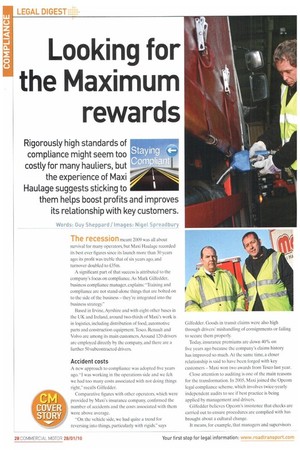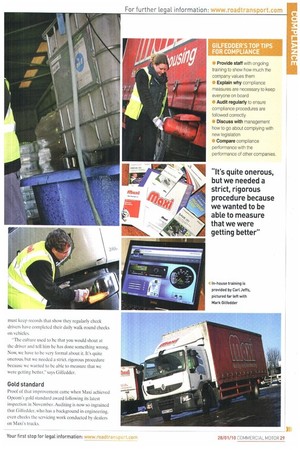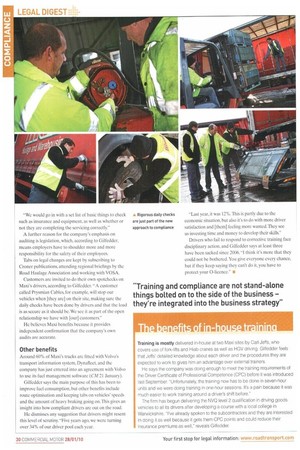Looking for the Maximum rewards
Page 28

Page 29

Page 30

If you've noticed an error in this article please click here to report it so we can fix it.
Rigorously high standards of compliance might seem too costly for many hauliers, but the experience of Maxi Haulage suggests sticking to them helps boost profits and improves its relationship with key customers.
Words: Guy Sheppard / Images: Nigat Spreadbury The recession meant 2009 was all about survival for many operators, but Maxi Haulage recorded its best ever figures since its launch more than 30 years ago: its profit was treble that of six years ago, and turnover doubled to £35m.
A significant part of that success is attributed to the company's focus on compliance. As Mark Gilfedder, business compliance manager, explains: -Training and compliance are not stand-alone things that are bolted on to the side of the business they're integrated into the business strategy."
Based in Irvine, Ayrshire and with eight other bases in the UK and Ireland, around two-thirds of Maxi's work is in logistics, including distribution of food, automotive parts and construction equipment Tesco, Renault and Volvo are among its main customers. Around 120 drivers are employed directly by the company. and there are a further 50 subcontracted drivers.
Accident costs
A new approach to compliance was adopted five years ago. "I was working in the operations side and we felt we had too many costs associated with not doing things right," recalls Gilfedder.
Comparative figures with other operators, which were provided by Maxi's insurance company, confirmed the number of accidents and the costs associated with them were above average.
On the vehicle side, we had quite a trend for reversing into things, particularly with rigids," says Gilfedder. Goods in transit claims were also high through drivers' mishandling of consignments or failing to secure them properly.
Today, insurance premiums are down 40% on five years ago because the company's claims history has improved so much. At the same time, a closer relationship is said to have been forged with key customers Maxi won two awards from Tesco last year.
Close attention to auditing is one of the main reasons for the transformation. In 2005, Maxi joined the Opcom legal compliance scheme, which involves twice-yearly independent audits to see if best practice is being applied by management and drivers.
Gilfedder believes Opcom's insistence that checks are carried out to ensure procedures are complied with has brought about a cultural change.
It means, for example, that managers and supervisors must keep records that show they regularly check drivers have completed their daily walk-round checks on vehicles.
The culture used to he that you would shout at the driver and tell him he has done something wrong. Now, we have to be very formal about it. It's quite onerous. but we needed a strict, rigorous procedure because we wanted to be able to measure that we were getting better," says Gilfedder.
Cord standard
Proof of that improvement came when Maxi achieved Opcom's gold standard award following its latest inspection in November. Auditing is now so ingrained that Gilfedder, who has a background in engineering, even checks the servicing work conducted by dealers on Maxi's trucks. "We would go in with a set list of basic things to check such as insurance and equipment, as well as whether or not they are completing the servicing correctly." A further reason for the company's emphasis on auditing is legislation, which, according to Gilfedder, means employers have to shoulder more and more responsibility for the safety of their employees. Tabs on legal changes are kept by subscribing to Croner publications, attending regional briefings by the Road Haulage Association and working with VOSA. Customers are invited to do their own spotchecks on Maxi's drivers, according to Gilfedder." A customer called Prysmian Cables, for example, will stop our vehicles when [they are] on their site, making sure the daily checks have been done by drivers and that the load is as secure as it should be. We see it as part of the open relationship we have with [our] customers." He believes Maxi benefits because it provides independent confirmation that the company's own audits are accurate.
Other benefits Around 60% of Maxi's trucks are fitted with Volvo's transport information system. Dynafleet, and the company has just entered into an agreement with Volvo to use its fuel management software (CM 21 January).
Gilfedder says the main purpose of this has been to improve fuel consumption, but other benefits include route optimisation and keeping tabs on vehicles' speeds and the amount of heavy braking going on. This gives an insight into how compliant drivers are out on the road.
He dismisses any suggestion that drivers might resent this level of scrutiny. "Five years ago, we were turning over 34% of our driver pool each year. "Last year, it was 12% .This is partly due to the economic situation, but also it's to do with more driver satisfaction and [them] feeling more wanted. They see us investing time and money to develop their skills."
Drivers who fail to respond to corrective training face disciplinary action, and Gilfedder says at least three have been sacked since 2006. "1 think it's more that they could not be bothered. You give everyone every chance, but if they keep saying they can't do it, you have to protect your 0-licence." •
Training is mostly delivered in-house at two Maxi sites by Carl Jeffs, who covers use of fork-lifts and Hiab cranes as well as HGV driving, Gilfedder feels that Jeffs' detailed knowledge about each driver and the procedures they are expected to work to gives him an advantage over external trainers.
He says the company was doing enough to meet the training requirements of the Driver Certificate of Professional Competence (CPC) before it was introduced last September. "Unfortunately, the training now has to be done in seven-hour units and we were doing training in one-hour sessions. It's a pain because it was much easier to work training around a driver's shift before."
The firm has begun delivering the NV() level 2 qualification in driving goods vehicles to all its drivers after developing a course with a local college in Warwickshire. "I've already spoken to the subcontractors and they are interested in doing it as well because it gets them CPC points and could reduce their insurance premiums as well," reveals Gilfedder.
















































































































































